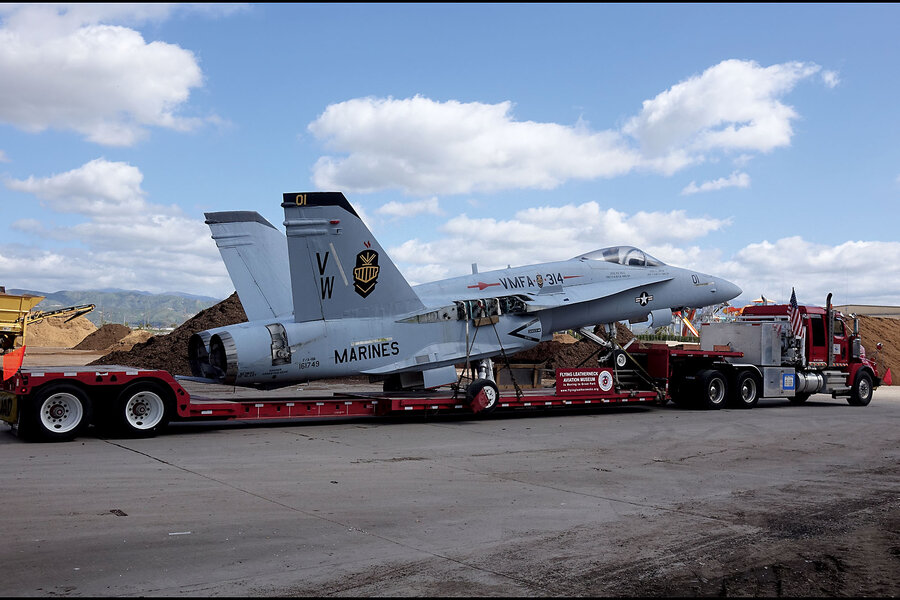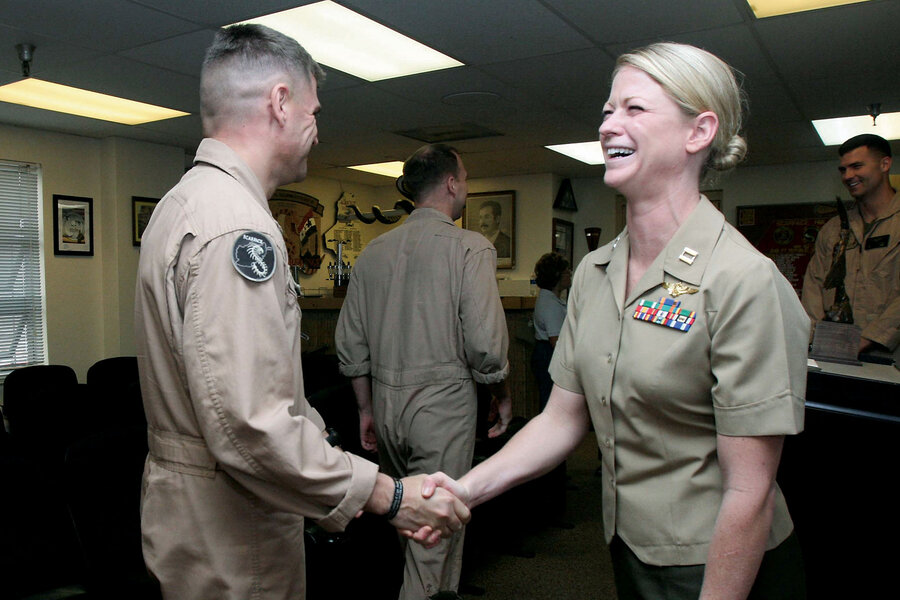This retired Marine pilot aims to be the role model she never had in Afghanistan
Loading...
| Dana Point, Calif.
Alexis Federico, who served in the Marines for a decade, has a mission these days that is no less important to her.
As a board member for the Flying Leatherneck Historical Foundation, Ms. Federico is working to relocate a Marine aircraft collection of more than 40 jets and helicopters. Their new home would be the Great Park, a popular public space built on part of a decommissioned base in Irvine, California. By building an aviation museum in the heart of the Great Park, Ms. Federico and a group of fellow retired Marines hope to educate the next generation about military service and maybe inspire interest in STEM careers.
Why We Wrote This
A story focused onFor a long time, Marine aviation was a man’s job. This retired helicopter pilot aspires to be the role model she didn’t have two decades ago.
Ms. Federico wants the future museum to open children’s eyes to all the pathways available to them. Besides publicly sharing her story of military service and her vision for diversity in the exhibits, Ms. Federico, an attorney, supports the Flying Leatherneck foundation’s board by parsing legal contracts with donors.
Whatever children do in life, she says, “you want them to walk [into the museum] and be like, ‘Wow, there’s a woman doing that’ or ‘Wow, that person looks like me.’”
Alexis Federico remembers being behind the controls of a roaring UH-1Y helicopter as it circled over mud-brick houses in Nawzad, Afghanistan, a Taliban stronghold. Her mission: Make sure no one harassed the Afghan girls walking to their schoolhouse with their fathers.
“We were over there providing support,” explains Ms. Federico, a decorated retired helicopter pilot. “They’re going to school, and we’re just watching them. I had a lot of great experiences in the Marine Corps, but for me, that was so, so great.”
Ms. Federico, who served in the Marines for a decade, including in Afghanistan from 2009 to 2010, now lives in Dana Point, California. But her mission these days is no less important to her.
Why We Wrote This
A story focused onFor a long time, Marine aviation was a man’s job. This retired helicopter pilot aspires to be the role model she didn’t have two decades ago.
As a board member for the Flying Leatherneck Historical Foundation, she is working to relocate an unmatched Marine aircraft collection of more than 40 jets and helicopters. Their new home would be the Great Park, a popular public space built on part of a decommissioned base, Marine Corps Air Station El Toro, in Irvine, California. By building a modern aviation museum in the heart of the Great Park, Ms. Federico and a group of fellow retired Marines hope to educate the next generation about military service and maybe inspire interest in STEM careers.
Passion for diversity
Ms. Federico says she would love for the future museum to open children’s eyes to all the pathways available to them. Besides publicly sharing her story of military service and her vision for diversity in the exhibits, Ms. Federico, a practicing attorney, has supported the Flying Leatherneck foundation’s board by parsing legal contracts with donors. She will also have a role during fundraising events for the museum.
“One of the things I’m passionate about on the board is making sure there’s representation,” she says. “It’s great to have museums that reflect what the military looked like back then, but the military looks very different now. It’s a lot more diverse, and you want that reflected not just because you hope some child is going to grow up and want to be a Marine aviator, aircraft mechanic, or logistician. Whatever they do in life, you want them to walk [into the museum] and be like, ‘Wow, there’s a woman doing that’ or ‘Wow, that person looks like me.’”
From 1989 to 1999, the aircraft and assorted aviation artifacts – including jet engines, photographs, maps, and a large collection of squadron patches – had been housed at El Toro until its permanent closure. The items were then moved south to Marine Corps Air Station Miramar. Over the years, a Vietnam War-era Pioneer drone was also acquired. These items were on display until the outbreak of the coronavirus pandemic.
In 2021, Miramar’s former commander declined to assist in reopening the museum because of budget constraints, says retired Marine Brig. Gen. Michael Aguilar, president and CEO of the Flying Leatherneck foundation. A group of retired Marine aviators who lead the foundation approached Irvine city officials with the idea of returning the collection to its previous home in Orange County. The foundation plans to construct the new museum at the Great Park, assuming the completion of a $46 million capital campaign. Irvine has provided a $20 million grant, and private funders have given an additional $6 million. Mr. Aguilar anticipates the museum could open in 2026.
In early March, a convoy of three trucks delivered the first batch of the museum’s collection – a MiG-15, an F/A-18A Hornet, and a T-34 Mentor – to the Great Park. Foundation members wearing red polo shirts and flight caps filmed the long-awaited homecoming at the cavernous hangar.
“Exactly what we need”
Retired Marine Col. Patrick “Paddy” Gough met Ms. Federico when she was an instructor with Marine Aviation Weapons and Tactics Squadron One based in Yuma, Arizona. After retiring with 30 years of military service, Mr. Gough joined the Flying Leatherneck board. He says it was composed of older, white, male retirees and in desperate need of new voices until Ms. Federico joined. “Alexis brings her knowledge of the law, and that’s key for us when we started looking at contractual requirements with the city [of Irvine],” Mr. Gough said. “She’s exactly what we need.”
Olivia Weber was a first-year law student at the University of California, Irvine in 2014 when she met Ms. Federico while both worked cases for the International Refugee Assistance Project. Although Ms. Federico was only a year ahead of them at the law school, Ms. Weber and her classmates looked up to Ms. Federico because of the experience and wisdom she acquired in the military. Both women ended up working for the same law firm. “She just always carries herself with such presence,” Ms. Weber says of Ms. Federico. “She is a true defender of her positions.”
Ms. Weber was also impressed by how her colleague worked long hours at the firm and then volunteered at an animal shelter every weekend caring for rabbits. “Nobody wants to volunteer for the bunnies, but Alexis does,” Ms. Weber says.
Ms. Federico also has used her post-service law training to support Afghan allies in navigating asylum cases. She successfully petitioned the State Department to grant a Special Immigrant Visa to a former Afghan interpreter, Farid Zahiri, who had assisted her husband when he served in Afghanistan as a Marine aviator.
After Kabul fell to the Taliban in August 2021, the Federicos enlisted the aid of a California lawmaker to reunite Mr. Zahiri with his wife and mother on U.S. soil. Ms. Federico also took on a pro bono asylum case for a female engineer and Fulbright scholar from Kabul University who had cold-called her firm. The Afghan woman had returned to her home country to help the U.S. Army Corps of Engineers rebuild and to start a nonprofit to recruit more women into the construction business. She immediately received death threats.
Ms. Federico’s family has a history of military service. She grew up on the move with an Air Force dentist as a father. Her grandfather served as a helicopter crew chief in the Korean War. She vividly remembers when they flew in a private plane and let her handle the controls for the first time.
In 2003, when she earned her commission from the Marine Corps, it was normal to be the only female pilot in a helicopter squadron, Ms. Federico recalls. Women flying the same aircraft had yet to rise through the ranks. Two decades later, she strives to be the role model she didn’t have.
At her suburban home, an infant bouncer for Ms. Federico’s young daughter dangles in the kitchen doorway. Four rabbits that the family fosters are corralled in the garage. In a large painting in the dining room, a rabbit stands at attention wearing a crimson Napoleonic War-era hussar uniform.
“Change the things you can change,” Ms. Federico says. “I can complain the government isn’t doing XYZ, but I can help out one person, volunteer at an animal shelter, and help open a new museum.”









